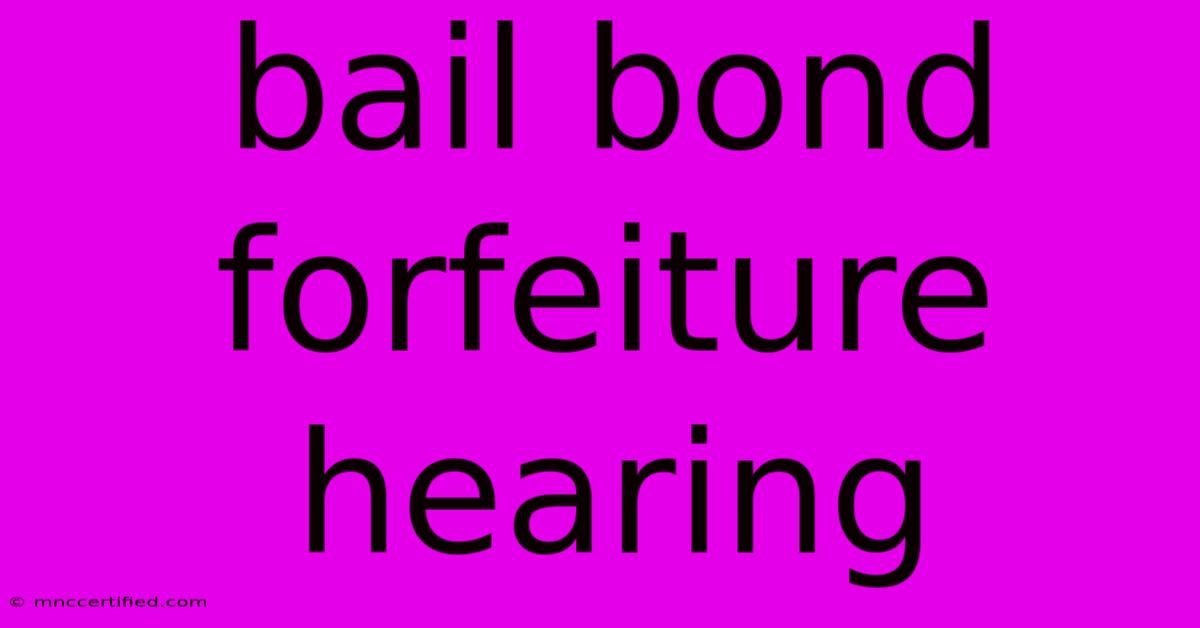Bail Bond Forfeiture Hearing

Table of Contents
Bail Bond Forfeiture Hearing: A Comprehensive Guide
Facing a bail bond forfeiture hearing can be a daunting experience. Understanding the process, your rights, and potential outcomes is crucial to navigating this legal challenge effectively. This comprehensive guide will walk you through everything you need to know about bail bond forfeiture hearings.
What is a Bail Bond Forfeiture Hearing?
A bail bond forfeiture hearing is a court proceeding where the court determines whether a bail bond should be forfeited. This typically happens when a defendant fails to appear for scheduled court dates after being released on bail. The bail bond, essentially an agreement between the defendant and the court (secured by a bail bondsman in many cases), guarantees the defendant's appearance. Failure to appear results in a breach of that agreement, leading to the forfeiture hearing.
The consequences of a forfeiture hearing can be severe, impacting not only the defendant but also their bondsman. For the defendant, it can mean the issuance of a warrant for their arrest, additional charges, and potential imprisonment. For the bondsman, it means losing the money they posted as surety. Therefore, understanding the intricacies of this legal process is paramount.
Understanding the Process
The process generally unfolds as follows:
- Failure to Appear: The defendant fails to attend a scheduled court date.
- Notice of Forfeiture: The court issues a notice of forfeiture to the defendant and the bondsman.
- Forfeiture Hearing: A hearing is scheduled to determine whether the forfeiture is justified.
- Defendant's Appearance: The defendant has the opportunity to appear and explain their absence. Failure to appear at this hearing often results in an automatic forfeiture.
- Evidence Presentation: Both the prosecution and the defense present evidence to support their respective arguments.
- Judge's Decision: The judge decides whether to forfeit the bond.
- Outcome: If the bond is forfeited, the court orders the bondsman to pay the full amount of the bond. If the defendant is found, they may face further legal consequences.
Common Reasons for Bail Bond Forfeiture
Several factors can lead to a bail bond forfeiture. These include:
- Failure to understand court dates: Misunderstanding the date, time, or location of court proceedings.
- Lack of transportation: Difficulty accessing reliable transportation to attend court.
- Unexpected emergencies: Unforeseen circumstances preventing attendance.
- Intentional avoidance: Deliberately avoiding court appearances to evade legal consequences.
Protecting Yourself During a Forfeiture Hearing
Several steps can significantly improve your chances during a bail bond forfeiture hearing:
- Hire an experienced attorney: Legal representation is crucial in navigating the complexities of the legal process. A lawyer can build a strong defense and advocate for your best interests.
- Gather evidence: Compile any documentation that supports your reasons for missing court (e.g., medical records, travel itineraries, proof of employment).
- Cooperate with the court: Promptly respond to all court communications and follow instructions carefully.
- Be honest and transparent: Provide truthful and accurate information to the court.
- Understand your rights: Know your rights and ensure they are respected throughout the process.
The Role of the Bail Bondsman
The bail bondsman plays a significant role in the forfeiture process. They are legally obligated to produce the defendant in court. If they fail to do so, they must pay the full amount of the bond. However, bondsmen often work diligently to locate the defendant and bring them before the court to avoid forfeiture.
Consequences of Bail Bond Forfeiture
The consequences of a bail bond forfeiture can be far-reaching:
- Financial penalties: The bondsman must pay the full amount of the bond.
- Criminal charges: The defendant may face additional charges, such as failure to appear.
- Warrant for arrest: A warrant for the defendant's arrest will be issued.
- Increased bail amount in future cases: Future bail amounts are likely to be significantly higher.
- Damage to reputation: A bail bond forfeiture can negatively impact the defendant's reputation and future opportunities.
Disclaimer: This article provides general information about bail bond forfeiture hearings and should not be considered legal advice. It is crucial to seek guidance from a qualified legal professional for your specific situation. The laws surrounding bail bond forfeiture vary by jurisdiction, and the information presented here may not apply in all cases.

Thank you for visiting our website wich cover about Bail Bond Forfeiture Hearing. We hope the information provided has been useful to you. Feel free to contact us if you have any questions or need further assistance. See you next time and dont miss to bookmark.
Featured Posts
-
College Football Rivalry Week Scenarios
Nov 30, 2024
-
Sheffield Utd Vs Sunderland Matchday Preview
Nov 30, 2024
-
Leadbeater Bill Future Of Assisted Dying
Nov 30, 2024
-
Barry Bonds 1987 Topps Value
Nov 30, 2024
-
Sunderland Fall To Sheffield United 1 0
Nov 30, 2024